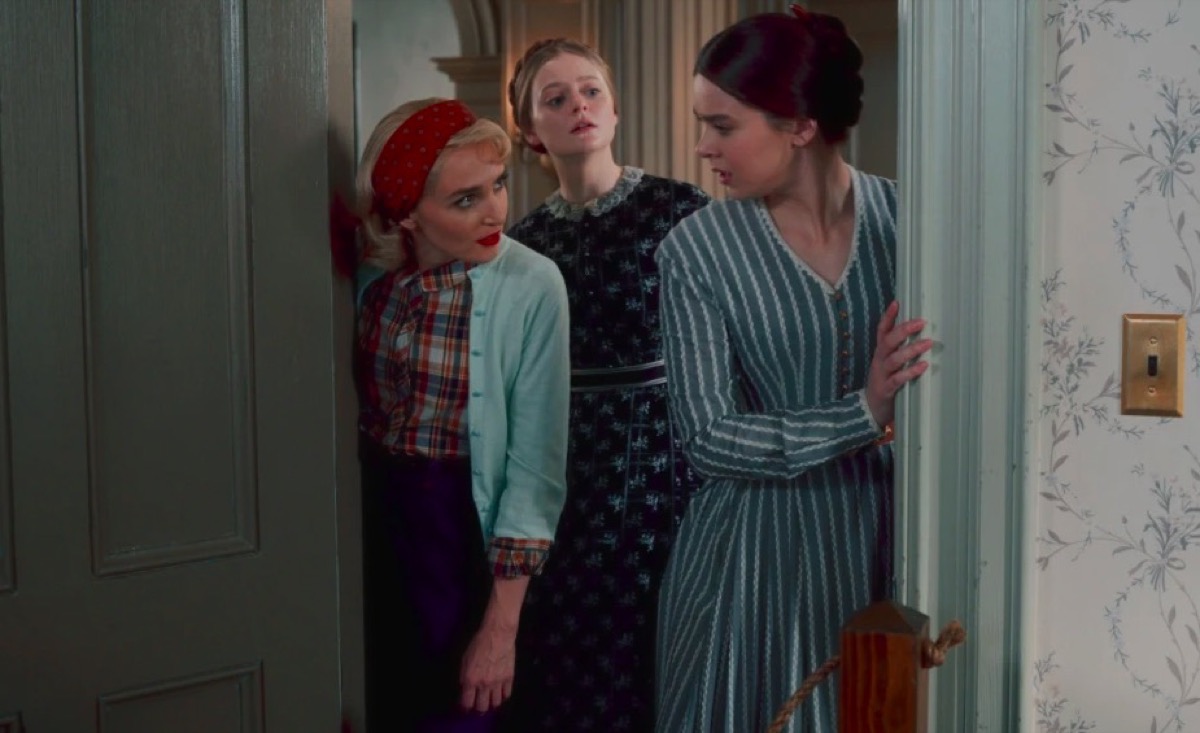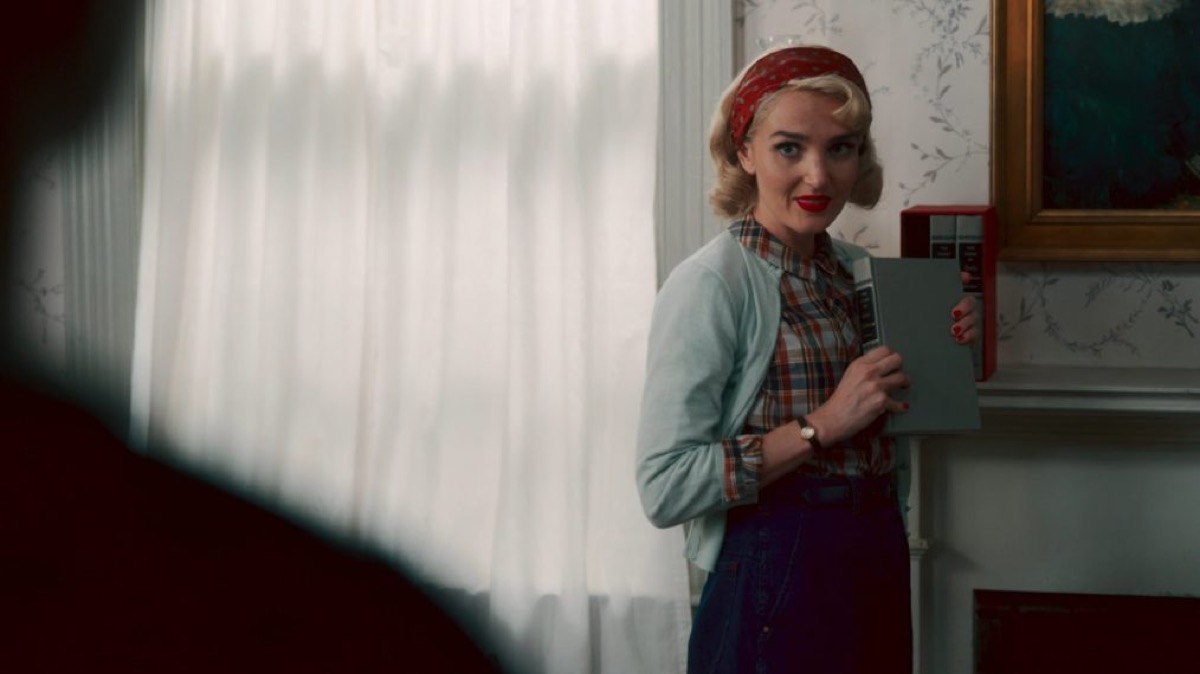The third and final season of Apple TV+’s Dickinson has achieved an impossible meeting with another great writer, courtesy of a time-traveling storyline.
In “The Future Never Spoke,” Emily (Hailee Steinfeld) and Lavinia (Anna Baryshnikov) go to 1955’s Amherst—no carriages in sight, as cars and planes have taken over, and oh my, women wear pants and go to college now?
Past the initial excitement and confusion, the sisters are in for an underwhelming ride and an unexpected chat with none other than poet Sylvia Plath, a Rosie the Riveter-inspired, rockabilly college senior played by SNL comedian Chloe Fineman.
Due to the magical realism of the series created by Alena Smith, it is perfectly acceptable for Emily to drag Lavinia on a casual summit with Plath, no questions asked. Suspended between truth and fiction, their journey is crucial in establishing the young poet’s identity and addressing the misconceptions about her story.
From Louisa May Alcott (Zosia Mamet) to Walt Whitman (Billy Eichner), Emily has networked with her fellow writers before. Whether in the flesh or as figments of the poet’s rich, buoyant imagination, these seminal authors have helped the protagonist determine her aspirations and dispel her doubts, but never really delved into her legacy.
The conversation with Plath offers Emily a glimpse of what lies ahead, and it’s not all that great. The head-spinning high of being a published author (thanks to Lavinia’s intervention) is drastically tarnished by knowing that, in the future, her life will be reduced to a bunch of stereotypes.
In the 1950s, Emily is remembered as a definitely reclusive, probably suicidal single woman writer longing for a mystery man. Backed by Lavinia, the poet argues that she is not “morbidly depressed” and certainly not pining away over some man’s unrequited affection. No, she is just fine, thank you very much. And yet, a woman who spends a great portion of her time working and focusing on honing her craft, with little chances left for social interactions—to the point that she neglects the love of her life (spoiler: not a man)—was and is still seen as an oddity, a miserable being.
Smith’s show has been working relentlessly to do right by Emily Dickinson, leaving some of the most outdated, sexist myths about her behind. In the series, the poet’s inner world brims with colors, contrary to what has filtered through some official sources: her white outfits and a death wish. Sure, Emily has her audiences with Death (Wiz Khalifa) throughout the three seasons, but their encounters are insightful and disruptive rather than bleak and dispiriting.

Emily supposedly courting death and being “the original sad girl” is why Dickinson’s Sylvia Plath believes they share a connection. While there is a kinship between the two poets, the show challenges the idea of women writers being a monolith. Dickinson and Plath both display a peculiar sensitivity and dark humor, often misunderstood by those around them, but they are first and foremost two artists getting acquainted with and battling their own demons.
Here, Emily claims her right to be a layered person—and one full of life, too. Sadly, the show doesn’t afford the same opportunity to The Bell Jar author, whose portrayal comes across as a caricature at times. Sylvia discusses her mental health openly—which feels refreshing and heartbreaking at once, given the poet’s fate—but she also appears one-dimensional and clichéd. The fleeting screen time the character is allowed might be partly to blame, leaving the audience craving for more to be said between her and Emily.
It is a bit disappointing that Sylvia seems to buy into the rumors about Emily and doesn’t get to actually see her when she’s right in front of her. A spokeswoman for the generations to come, Sylvia, too, misunderstands Emily. The latter, in turn, ignores who Plath will grow up to be and dismisses her as having a very “intense” energy. Their exchange is hilarious and a retroactive declination of the dangers of getting to know your heroes, who are ultimately just people.
Nonetheless, Sylvia is pivotal in one of the purest moments in the entire show. The 1950s poet mentions a book about Dickinson that insinuates that she could have been a lesbian. After changing the subject, Emily comes out to Lavinia, who welcomes her with open arms. In an uncharacteristically messy fashion, the protagonist declares her love for Sue (Ella Hunt) out loud, not just anonymously in her verses.
Prompted by Lavinia’s beautiful response, Emily realizes she has all she could ever want in her present. Because, rosier color grading aside, her back-to-the-future adventure turns out to be not much better than 1862. Perhaps Plath was right with her somber decree. “The future never comes for women,” she tells Emily before they part ways, foreshadowing the seemingly never-ending, exhausting cycle of battles awaiting.
The struggle to break free from the crystallized, harmful narratives built around women will always be real, the episode suggests. Despite such a cynically true proclaim, it looks like a better future may be coming for Dickinson and Plath, albeit tragically late. Their lives are still being unpacked by scholars and readers, committed to painting a fuller, more vibrant picture, right in the space between Sylvia’s blacks and Emily’s whites.
(images: AppleTV+)
Want more stories like this? Become a subscriber and support the site!
—The Mary Sue has a strict comment policy that forbids, but is not limited to, personal insults toward anyone, hate speech, and trolling.—
Have a tip we should know? [email protected]
